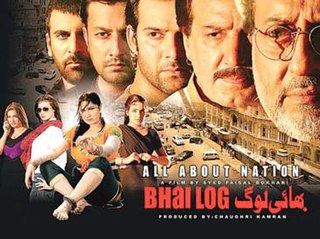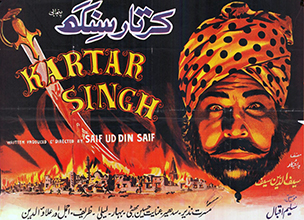Related Research Articles
Bukhari, also spelled as Bokhari, Bukhary or Bukhori, is a common surname in South Asia and in the Muslim world, meaning "from Bukhara".
Chan Mahi is a Pakistani Punjabi-language film released on 2 November 1956. The film, directed by Anwar Kamal Pasha, became a popular musical film with many super-hit film songs.

Al-Naghawi is a nisba (surname) derived from an epithet of Ali al-Hadi, namely “Al Naqi”. People bearing this nisba are descendants of him through their agnatic lineage.

Bhai Log is a Pakistani Urdu film directed by Syed Faisal Bukhari, produced by Chaudhry Ijaz Kamran, with dialogues and screenplay By M. Pervaiz Kaleem. The cast includes Moammar Rana, Shamoon Abbasi, Saima Noor, Nadeem Baig, Javed Sheikh, Noor, Babrik Shah, Meera, Nayyar Ejaz, Babar Ali, and Shafqat Cheema in lead roles. The music is composed by M. Arshad. The film was released on Eid-ul-Fitr 2011. It was a moderate box office hit.
Mukhra is a super-hit 1958 Pakistani Punjabi-language film. Many of its songs became very popular due to its superb music by Rasheed Attre.

Kartar Singh is a 1959 Pakistani Punjabi-language film about the partition of India in 1947 and the widespread violence that accompanied it.
Heer is a 1955 Pakistani Punjabi-language film produced by J.C. Anand, directed by Nazir starring Swaran Lata and Inayat Hussain Bhatti in title roles.
Abdul Rasheed Attray, also known as Rasheed Attre, was a Pakistani film score composer.
Barson Baad is a popular drama serial shown on the PTV network in 2006. The drama was written by Nasir Jaffri, scripted by the late Salman Wajih Hassan and directed by Syed Faisal Bukhari. The show was filmed in Pakistan and Scotland.
Zubaida Khanum was a Pakistani playback singer who recorded over 250 film songs during the Golden Age of Pakistani film music of the 1950s and 1960s. She was considered Pakistani equivalent to Marni Nixon of Hollywood for giving voice to featured actresses in movie musicals.
Zubaida is an Arabic (زُبَيْدَة), feminine given name that means "soft-bodied", "like cream", and is also an idiom for prime, originating from the fact that cream is the prime part of the dessert, or the core of something that is growing. It is mostly used in Asia.
Mian Sheheryar was a Pakistani television and film music composer.

Hassan Latif was a Pakistani film and radio music director known for composing popular film songs like, "Ja apni hasraton pe aanson baha ke sou ja" and "Gaadi ko chalana babu zara halkay halkay". Latif composed a Naʽat for the film Noor-e-Islam (1957), "Shah-e-Madina Yathrib Ke Waali", that is still regarded as a classic.
Safdar Hussain was a Pakistani musician who composed playback melodies for Urdu and Punjabi Lollywood films in the decades from 1950s to 1980s.

Rehman Verma was a Pakistani music director. He composed playback music for Lollywood's first-ever action movie, Baghi, in 1956. He was one member of the musical duo "Sharma Ji - Verma Ji" along with the Bollywood musician Khayyam whose family name was Sharma. before the partition of India and Pakistan in 1947.

Raaz is a 1959 Pakistani suspense thriller film directed by Humayun Mirza. It stars Ejaz Durrani, Musarrat Nazir, Allauddin and Shamim Ara. The film revolves around a police officer who left his job to prove the innocence of his friend who is accused of a murder.
Noor-e-Islam is a 1957 Pakistani costume drama film directed by Nazir and produced by J.C. Anand under banner Eveready Pictures.
References
- ↑ "Pakistani singer Zubaida Khanum dies aged 78". BBC News. 20 October 2013. Retrieved 13 August 2023.